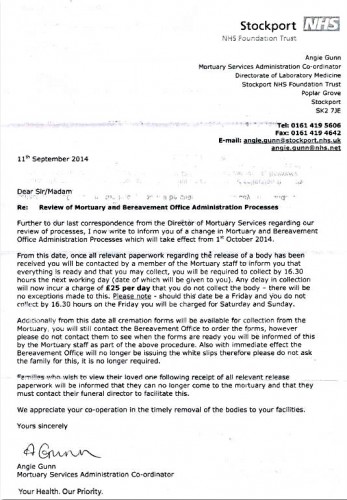Guest post by John Porter
Anyone who says to me “You have to”, I nearly always reply with “why?” and then “why?” again!
The fact is I don’t have to do anything. I can choose whether to or not – that’s different. “Not so,” I hear some say, “you have to have car insurance – it’s the law!” Well, as a magistrate I can safely say that many people who have appeared before me have chosen not to have it (or can’t get it as they are disqualified – much more serious m’lud – “take him down” I hear!). The repercussions are great – fines and increased cost of policies being just two, but the fact remains they had a choice, exercised it, broke the law and either did or did not have to face the consequences. Some offenders weigh up the risks and simply see being caught as an occupational hazard!
Let me turn to the issue that is on my mind as a funeral celebrant. “You need insurance”. There it is again. “Why?”, I ask.
Well someone might sue you if you get the deceased’s/other key names wrong or if you don’t make it to the funeral ceremony on time.
Do these questioners really understand the legal concept of negligence? The question is likely to be asked by funeral directors before taking on a new funeral celebrant. “Five million is the usual cover” I have heard some say. The “flavour” is usually public liability which I think is rather odd. I am a guest in peoples’ homes when I interview them and a professional celebrant at a chapel or wherever that I have no legal responsibility for. So is this right? If not, then is it professional indemnity? This goes back to the negligence issue and could be pretty tricky to prove.
I asked an insurance expert (not impartial) who advises funeral celebrants about this and he said:
“I have had many conversations with Insurers and Civil Celebrants on the question of Professional Indemnity as opposed to Public Liability and would comment as follows: The usual basic cover wording for Professional Indemnity Insurance is as follows –
‘To indemnify The Insured, subject to the indemnity limit and excess, against any claim for any civil liability which arises out of the conduct of professional business by reason of any negligent act, negligent error or negligent omission occurring or committed in good faith by the insured and or others expressly authorised to act for or on behalf of the insured.’
Other similar wordings are sometimes used but the essence remains the same and the full cover of course includes defence costs, intellectual property etc. etc. but the above extract is the clause that needs explanation as regards Civil Celebrants.
The words ‘civil liability’ are important as this means that a Court has to agree that a Celebrant has been negligent – it would not be the case that an insurer would simply pay a Celebrant the cost of a missed funeral for the client to be reimbursed by the Celebrant. The Celebrant’s client would have to prove in Court that the Celebrant was liable and had been negligent. I imagine that this would perhaps cause more upset than the original missed appointment or late arrival etc. Secondly there is always an excess on the policy which may be higher than the cost of the funeral although perhaps if the whole event was cancelled there may be other costs involved but it is still possible that the total financial loss would fall within the excess.
If a funeral did proceed late or at a later date, I do not think the Court would be able to agree on a financial or emotional loss. Negligence has to be proved in Court and insurers feel this would be neigh on impossible to quantify.
In essence then John, my feeling, and that of insurers, is that the risk of Public Liability is far greater than that of Professional Indemnity and it is the case that many crematoria and halls hired for the purpose of a funeral or function are now insistent on the hirer or organizer having a valid Public Liability policy in force before hiring the premises in case of accident or damage.”
They can insist for all they like as far as I’m concerned – I am not the hirer of a crematorium but a contracted disbursement of the funeral director – the person who hires is the client. “Ah, but then we won’t take you on” – a mild threat that hovers in the background in funeral parlours. It’s as clear as mud to me.
So what am I to do? It’s not a huge amount of money; I was quoted £120 for both types of insurance but I am struggling to see what the real risks are. Being a magistrate I’m a stickler for keeping my nose clean. This is different. There seems to be an implied sense of obligation for risks that are not, in my view, that great.
So: “I ain’t gotta hav it” may be my chosen course. Perhaps there are folk out there who can see the elephant standing behind me and set me on the straight and narrow path to insurance enlightenment!

